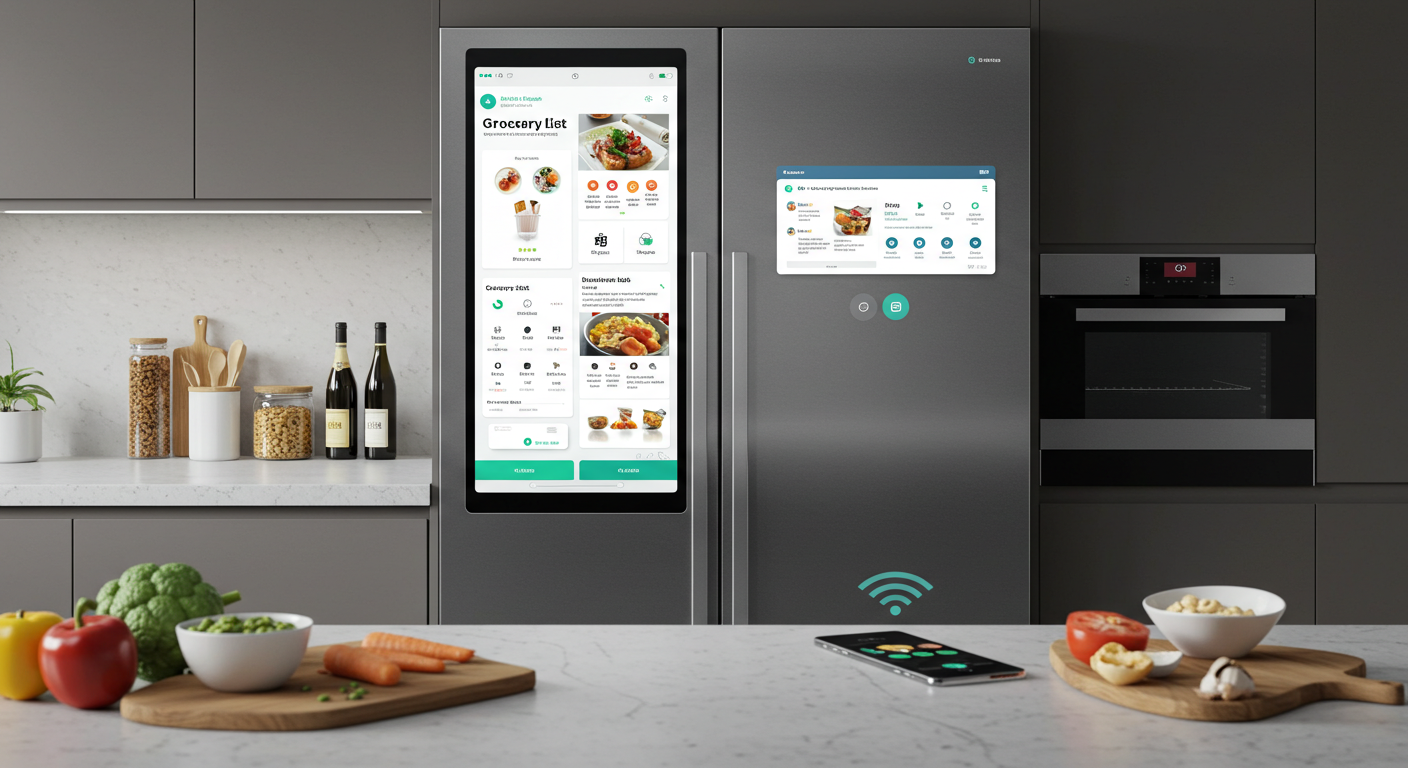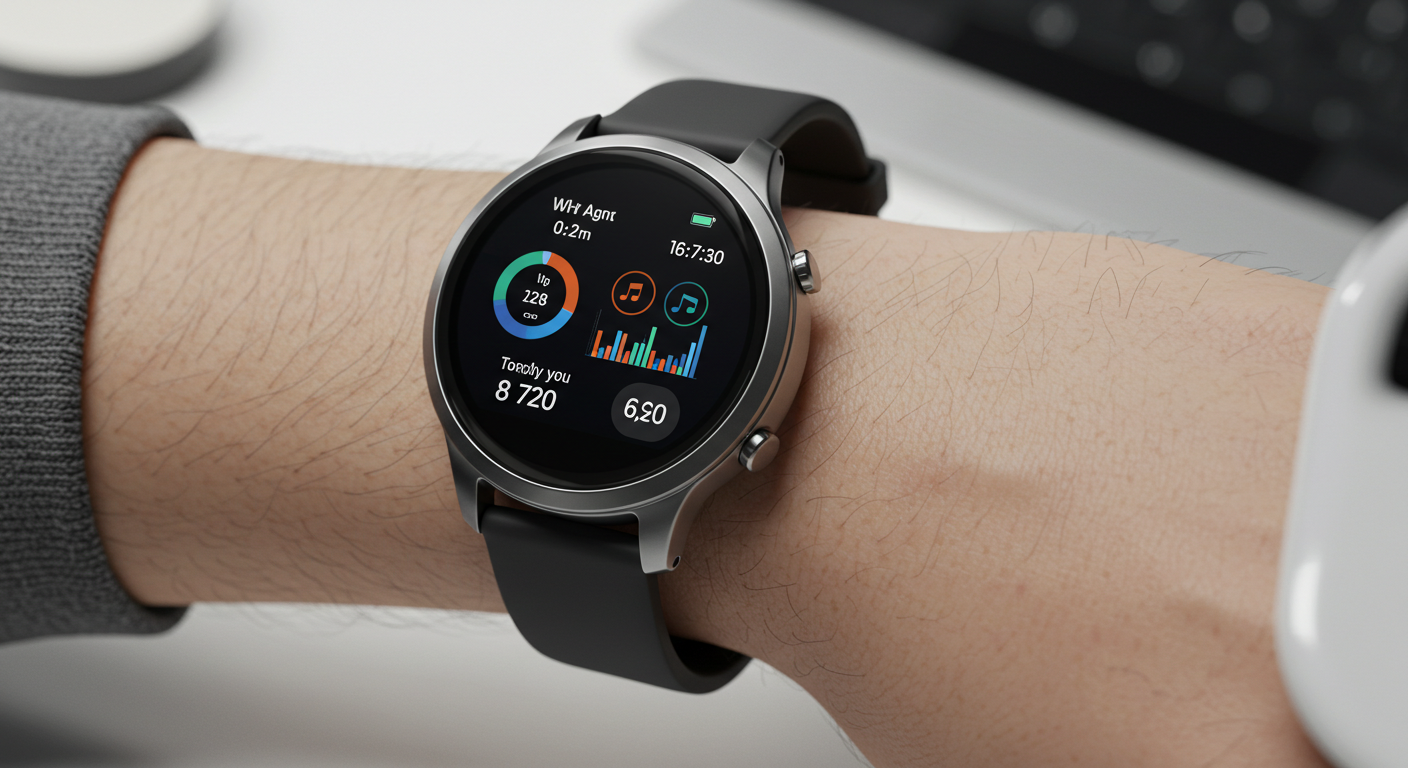Ever wondered if your refrigerator could do more than just keep your food cold? Imagine a fridge that helps you shop, suggests recipes, and even tells you when your milk is about to expire. With the rise of smart home technology, this is now possible with a smart fridge!
So what is a smart fridge? A smart fridge is a refrigerator equipped with advanced technology, allowing it to connect to the internet and interact with other smart devices. This means your fridge can go beyond just storing food – it can enhance your kitchen’s efficiency, keep track of groceries, and even make your everyday routines a little more convenient.
In this guide, we’ll explore what smart fridges are, how they work, the benefits they offer, and help you determine whether investing in one is the right choice for you. Let’s dive into the world of smart fridges!
What is a Smart Fridge?
A smart fridge is more than just a place to store your groceries – it’s a tech-savvy appliance designed to make your life easier and more efficient.
Unlike traditional fridges, which simply maintain cold temperatures, smart fridges integrate advanced technology to provide a wide range of features that improve convenience and enhance the functionality of your kitchen. Let’s take a deeper look into how smart fridges work and what makes them so unique.
Internet Connectivity
One of the defining features of a smart fridge is its internet connectivity. This allows the fridge to connect to your Wi-Fi network, enabling remote access and integration with other smart devices in your home.
Whether you’re checking the fridge’s contents while at the grocery store or adjusting the temperature while you’re away, this connectivity brings a whole new level of convenience.
Touchscreen Interfaces
Many smart fridges come equipped with a built-in touchscreen that acts as a control panel for various functions. These touchscreens allow you to easily adjust settings, browse recipes, view your grocery list, or even check the weather, all from one convenient location. They help transform your fridge into a hub for kitchen management.
Interior Cameras
Gone are the days of forgetting what’s in your fridge. Interior cameras in smart fridges provide real-time visibility of the fridge’s contents via a smartphone app. This feature is especially useful for inventory management, as it helps you track what you have and what you need, reducing food waste and making grocery shopping a breeze.
Sensors and Automation
Smart fridges are equipped with sensors that monitor important factors like temperature, humidity, and food inventory. These sensors adjust settings automatically for optimal food preservation. For example, if the fridge detects that the temperature is rising due to a door being left open, it can automatically adjust to ensure your food stays fresh.
Smart fridges combine technology and convenience to make food storage smarter and more efficient, keeping you connected to your kitchen like never before.
Core Features and Functionalities of a Smart Fridge
A smart fridge offers a wide array of innovative features designed to make your kitchen more convenient, efficient, and connected. From keeping track of food inventory to helping with meal planning, these high-tech refrigerators go far beyond basic food storage.
Here’s a breakdown of the core features and functionalities that make smart fridges a game-changer for any kitchen.
Inventory Management
Smart fridges are equipped with sensors and cameras that automatically monitor the items inside. They can track expiration dates and even alert you when supplies are low. With this feature, you’ll never have to guess what you have in the fridge, and it’s easier to plan your shopping list without wasteful overbuying.
One of the most convenient features of a smart fridge is the ability to view and manage its contents remotely. Using a smartphone app, you can check what’s inside your fridge while you’re at the store, ensuring you don’t forget important items or buy things you already have.
Recipe Suggestions and Meal Planning
Smart fridges often come with a built-in library of recipes that you can access based on the ingredients available in your fridge.
This functionality allows you to make the most of what you already have, reducing food waste and inspiring new meal ideas. Simply input what you’ve got, and the fridge suggests creative meals you can prepare with those ingredients.
Planning your weekly meals can be a time-consuming task, but a smart fridge can help by providing meal planning assistance. Based on the contents of your fridge, it can suggest meal plans for the week, making sure you use up your groceries efficiently. It also helps reduce food waste by ensuring ingredients don’t expire before they’re used.
Energy Efficiency and Cost Savings
Smart fridges are designed to be more energy-efficient than traditional fridges. They come with advanced sensors that adjust temperatures based on how frequently the fridge is used. This optimization reduces energy consumption, keeping your food fresh while lowering your electricity bill.
Another handy feature of smart fridges is their ability to send you maintenance alerts. These notifications remind you when it’s time to replace filters or schedule servicing, ensuring your fridge runs efficiently for longer. This can help you avoid costly repairs or replacements down the line and keeps your appliance functioning at its best.
Entertainment and Connectivity
Smart fridges are not just for food management—they can also enhance your cooking experience. With multimedia integration, you can listen to music, watch videos, or check the news on the fridge’s touchscreen while you cook or dine.
This feature can make your kitchen feel more like a hub for entertainment and productivity, perfect for busy households or those who love cooking with a soundtrack.
A smart fridge can seamlessly connect with other smart devices in your home, including voice assistants like Alexa or Google Assistant, smart lighting, and security systems. This integration allows you to control your fridge and other devices with simple voice commands or through a central app, making your home smarter and more connected.
Potential Drawbacks and Considerations
While smart fridges offer many exciting features, it’s important to consider potential drawbacks before making an investment. Like any high-tech appliance, smart fridges come with certain challenges and considerations that could impact your decision.
Cost
Smart fridges generally come with a higher price tag compared to traditional refrigerators. This increased cost is due to the advanced technology and features, such as touchscreen interfaces, connectivity, and internal cameras. It’s essential to determine if these features are worth the extra cost based on your kitchen needs.
Before investing in a smart fridge, evaluate whether the features justify the price in the long run. While some may find the convenience of automated inventory tracking or smart home integration to be worth the investment, others might feel the additional cost doesn’t align with their everyday kitchen requirements.
Security and Privacy
Being internet-connected, smart fridges can be vulnerable to security breaches if not properly secured. Hackers could potentially access personal information or disrupt the appliance’s functionality. It’s important to regularly update the fridge’s software and ensure your home network is secure to avoid these risks.
Smart fridges collect data on the items inside, expiration dates, and usage patterns. This data could be shared with third-party companies or used for advertising purposes. It’s worth considering how much privacy you’re willing to sacrifice for the convenience of smart features, and understanding how your appliance collects, stores, and uses data.
Reliability and Dependence on Technology
As with any tech-driven appliance, there is always the potential for bugs or system failures. Dependence on software means the fridge could experience glitches that affect functionality. If the system malfunctions, you may lose access to important features like inventory tracking or remote control.
Many features of a smart fridge require a stable internet connection to function properly. If there is a disruption in your Wi-Fi, it could limit the fridge’s abilities, such as remote access or smart notifications. A consistent internet connection is essential for the full functionality of your smart fridge.
Are Smart Fridges Worth It?
When considering whether a smart fridge is worth the investment, it’s important to evaluate how well its features align with your specific needs. A smart fridge offers great convenience and advanced functionality, but you must determine if these advantages are essential for your lifestyle.
Assessing Your Needs
Consider whether the features of a smart fridge match your cooking habits, family size, and tech-savviness. If you’re someone who loves to cook, enjoys meal planning, and appreciates smart technology, the convenience of automatic inventory tracking and recipe suggestions may be invaluable.
However, if you don’t often cook or use advanced kitchen appliances, these features may not be necessary. Weigh the benefits against the cost to determine if the investment is financially feasible for you.
Alternative Options
If a smart fridge feels like a major investment, there are other ways to integrate smart features into your kitchen without purchasing a fully connected appliance. For example, you can add smart plugs or temperature monitors to your existing fridge to remotely monitor its temperature.
Additionally, using smartphones or tablets in the kitchen for recipe access and inventory tracking can provide many of the same conveniences without the need for a high-priced smart fridge.
Conclusion
Smart fridges offer a blend of convenience, efficiency, and connectivity, transforming the traditional kitchen experience by integrating advanced technology.
While they provide numerous benefits, from inventory management to energy efficiency, it’s important to consider your needs and budget before making an investment.
If the features align with your lifestyle, a smart fridge could be a great addition to your home, but there are also alternative solutions to explore if you’re not ready to commit to the full price tag.


